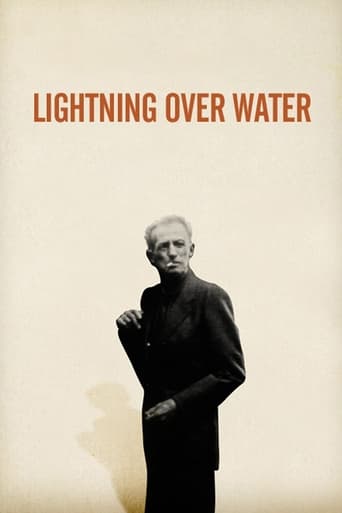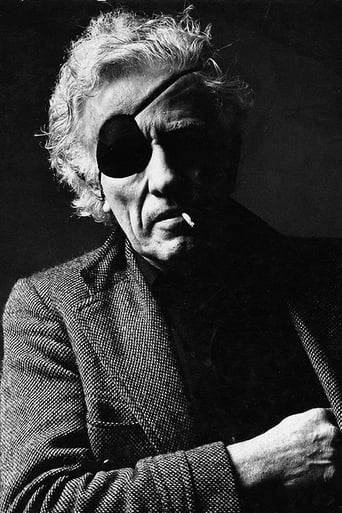Lightning over Water (1980)
Director 'Nicholas Ray' is eager to complete a final film before his imminent death from cancer. Wim Wenders is working on his own film Hammett (1983) in Hollywood, but flies to New York to help Ray realize his final wish. Ray's original intent is to make a fiction film about a dying painter who sails to China to find a cure for his disease. He and Wenders discuss this idea, but it is obviously unrealistic given Ray's state of health.
Watch Trailer
Free Trial Channels
Cast


Reviews
What a waste of my time!!!
The film was still a fun one that will make you laugh and have you leaving the theater feeling like you just stole something valuable and got away with it.
Clever and entertaining enough to recommend even to members of the 1%
The film's masterful storytelling did its job. The message was clear. No need to overdo.
Lightning Over Water began as a collaborative idea to tell the story of a dying painter who steals art from museums and replaces them with his own forgeries. Suffering from terminal cancer himself, Ray's health quickly deteriorates during the project. The film eventually ceases to be a work of fiction and becomes a documentary of Ray's finals days in which he fittingly spends making film. In reflecting over his career and life, Ray ponders his successes and failures as a film maker who is best known for Rebel Without a Cause (1955). A poignant and often disturbing film, Lighting Over Water is ultimately a painful homage to a film maker and to a friend (Klaus Ming March 2013).
The more that I watch of the 1970s New German Cinema (Das Neue Kino) the more manifest it becomes that, despite the usual namedropping of Wim Wenders, Rainer Werner Fassbinder, and Werner Herzog as a trio, it truly was only a one man movement, and Herzog is and was so far above and cinematically dominant over his two rivals that to speak of the lesser two in the same breath as Herzog is like mentioning the Gawain poet whilst going on of John Donne's or William Shakespeare's poetic skills.This is abundantly clear in lightweight films like the 1980 pseudo-documentary Lightning Over Water, directed by Wenders- with a meaningless co-credit to his idol Nicholas Ray, whose death is central to the film, and who, along with Wenders, is credited as a co-writer. In a sense this equivalence is apropos, since Wenders and Ray are both, at best, second tier filmic talents. After Johnny Guitar and Rebel Without A Cause- the James Dean teenaged sudser, are there any real films of note that Ray directed? And, neither of the two films mentioned is anywhere near greatness. The only reason that this misshapen mess of a film was made was because Ray was something of an idol to Wenders, and dying of cancer, not long after the two men met filming The American Friend a few years earlier.Yet, none of this camaraderie nor artistic affinity comes through in the film for we see only one brief movie clip, from Ray's Lusty Men, we get no background on Ray's life, and all we are subjected to, during the film's VERY LONG ninety minutes, is Ray's wheezing, hacking, spitting, whining, and assorted other bodily noises as he lies about, waiting to die, as Wenders narrates that this or that moment made him feel bad. Add to that conversations that are supposed to be 'real' yet are clearly not a part of the 'internal documentary,' and some poorly acted and staged scenes that are meant to illuminate the tale of Wenders' trip to Ray's bedside, while also trying and failing to break down narrative conventions, and you have a genuine disaster . The film was shot both in film and video, but this mixed media adds nothing of consequence to the meaning nor import of what it captures. I guess the video adds a bit of realism to Ray's decline, but the fact is that there really is nothing here besides such a minor addition. Let me sum up the film this way: imagine sitting at a funeral home and listening to strangers ramble on about the neighbors and old friends of a loved one that you know nothing about. And to top it off, the storytellers are dreadful at their craft, and furthermore never complete any of the tales. Worse, there is no connection to the audience for they are telling tales only they know anything about. Thus the viewer feels no empathy for Ray nor Wenders. Even more annoyingly, there are some shots that are so amateurish and badly composed that one has to wonder if Wenders deliberately screwed up his film to try to 'show' that he was so upset that he could not do his job properly; in a sense employing faux amateurism to try to cynically manipulate viewers into jerking tears over his dead friend.Regardless of whether or not this is the case, in the end, all the manifestly feigned experimentalism is just dull. Not even some well composed shots of the bygone Twin Towers can elicit genuine emotional responses. Then comes the penultimate scene of Ray, near death, lecturing Wenders, who inexplicably is lying in bed in a fake hospital scene. This scene is just painful to watch, for Ray's out of his mind and merely rambling. Wenders shows this for seven minutes and the result is borderline pornography, full exploitation, and plain old sadistic, because nothing is gained. I felt a minor anger and contempt for Wenders during this, but it passed, as all else in this empty vessel does.Yet, did Wenders really think that this sequence would illumine death- Ray's or any others? Apparently so, which only demands that the flaw of pretension be added to this film's artistic sins, which include treacly sermonizing, such as when Wenders asks, in all apparent seriousness, such banal queries as whether or not telling the truth is dull or exciting. All in all, Lightning Over Water is a bad film, an inconsequential and failed extension of the documentary form, a weak statement on art and/or death, and not even a good record of the late 1970s fashion nor culture. It is basically a pointless vanity project that never coheres, for it has no narrative nor emotional cement to hold its flimsy structure together. This fact provokes only two real questions- who was more vain, Ray or Wenders? And did the right filmmaker die?
Two video versions of this film exist, both roughly the same length. The first was released by Pacific Video on VHS in 1987, the second just this month (1/03) by Anchor Bay on DVD. According to Kathe Geist's book "The Cinema of Wim Wenders: From Paris France to Paris Texas," Wenders was so depressed by the filming of "Lightning" and Ray's death that he handed the footage over to his editor, Peter Przygodda, who spent a year fashioning it into a version shown at Cannes; apparently this is also the version released by Pacific Video in 1987 and which I first saw around that time (and have watched many times since). Wenders supposedly found this version obscure and depressing and re-edited, adding a voiceover (his own) and superimposing passages from Ray's diary; this is the version just released on DVD, and is considered by some the definitive edition. But I find Wender's criticism of the initial cut confusing, for it's the LATTER cut (his own) which is murky and depressing. Nick Ray's final scene, for example ("Cut...Don't Cut.") is tortuous (we're watching a man dying), and there are sequences edited so bizarrely as to be almost incomprehensible. The first cut, in contrast, has a narrative flow and progression that make it easier to absorb, though it's still tough going as we witness Nick Ray's suffering. Also, Wender's narration in the 2nd version (absent in the initial cut) actually adds little to the film. The first version is unfortunately out of print but is worth tracking down because it's the superior one.
this is a film i forced myself to watch in order to complete a speech in german about wim wender's amerkiabild. it is all about the death of a cancer ridden man. that is about all of the plot i could figure out.the images, as is usual with wender's films, are striking and pungent to the hollywood-movie-goer senses. the scenes in this movie are about the slowest i have ever seen. i did find a few rewarding scenes here and there scattered throughout the chaos. the graduate monkey, the speech at vassar college, and the alarm clock scene to mention a few.that is about all i know on this one.i give it two riders of the apocalypse.








